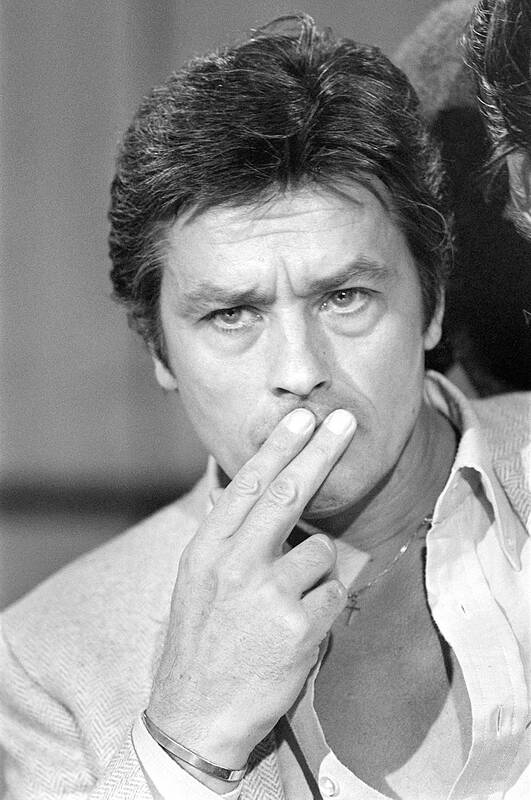Actor Alain Delon — who died yesterday aged 88 — was France’s greatest screen seducer.
To some he was the sexiest man of the 20th century who played the impeccably tailored, ice-cold killers popularized by 1960s New Wave films to perfection.
To others, the man who often referred to himself in the third person and admitted to having slapped a woman, was an egotistical chauvinist, with feminists appalled by the lifetime achievement award the Cannes Film Festival gave him in 2019.

Photo: AFP
His millions of fans, from France to Japan — where Delon was adored as an idol of male beauty — were prepared to overlook his failings.
The whiff of sulfur and his angelic face also proved an irresistible combination to a long line of glamorous actresses who fell for him.
In a note to Delon on his 80th birthday, one of his oldest friends, fellow 1960s icon Brigitte Bardot, called him “an eagle with two heads ... the best and the worst.”
Delon’s legend was launched in 1960, playing pretty boy killers and mysterious schemers in Purple Noon — later remade as The Talented Mr Ripley — and Luchino Visconti’s The Leopard. He then set the template for one of Hollywood’s favorite tropes — the mysterious, cerebral hit man — with his staggering performance as the silent killer in Jean-Pierre Melville’s Le Samurai (1967).
Directors from Martin Scorsese and Quentin Tarantino to John Woo (吳宇森) all acknowledge a debt to the inner life Delon gave his stylish killer.
Despite the mixed emotions he generated, film historian Jean-Michel Frodon said no other French male actor in the last half century “had the same screen presence.”

‘UNUSUAL EVENT’: The Australian defense minister said that the Chinese navy task group was entitled to be where it was, but Australia would be watching it closely The Australian and New Zealand militaries were monitoring three Chinese warships moving unusually far south along Australia’s east coast on an unknown mission, officials said yesterday. The Australian government a week ago said that the warships had traveled through Southeast Asia and the Coral Sea, and were approaching northeast Australia. Australian Minister for Defence Richard Marles yesterday said that the Chinese ships — the Hengyang naval frigate, the Zunyi cruiser and the Weishanhu replenishment vessel — were “off the east coast of Australia.” Defense officials did not respond to a request for comment on a Financial Times report that the task group from

Chinese authorities said they began live-fire exercises in the Gulf of Tonkin on Monday, only days after Vietnam announced a new line marking what it considers its territory in the body of water between the nations. The Chinese Maritime Safety Administration said the exercises would be focused on the Beibu Gulf area, closer to the Chinese side of the Gulf of Tonkin, and would run until tomorrow evening. It gave no further details, but the drills follow an announcement last week by Vietnam establishing a baseline used to calculate the width of its territorial waters in the Gulf of Tonkin. State-run Vietnam News

DEFENSE UPHEAVAL: Trump was also to remove the first woman to lead a military service, as well as the judge advocates general for the army, navy and air force US President Donald Trump on Friday fired the chairman of the Joint Chiefs of Staff, Air Force General C.Q. Brown, and pushed out five other admirals and generals in an unprecedented shake-up of US military leadership. Trump wrote in a post on Truth Social that he would nominate former lieutenant general Dan “Razin” Caine to succeed Brown, breaking with tradition by pulling someone out of retirement for the first time to become the top military officer. The president would also replace the head of the US Navy, a position held by Admiral Lisa Franchetti, the first woman to lead a military service,

Four decades after they were forced apart, US-raised Adamary Garcia and her birth mother on Saturday fell into each other’s arms at the airport in Santiago, Chile. Without speaking, they embraced tearfully: A rare reunification for one the thousands of Chileans taken from their mothers as babies and given up for adoption abroad. “The worst is over,” Edita Bizama, 64, said as she beheld her daughter for the first time since her birth 41 years ago. Garcia had flown to Santiago with four other women born in Chile and adopted in the US. Reports have estimated there were 20,000 such cases from 1950 to